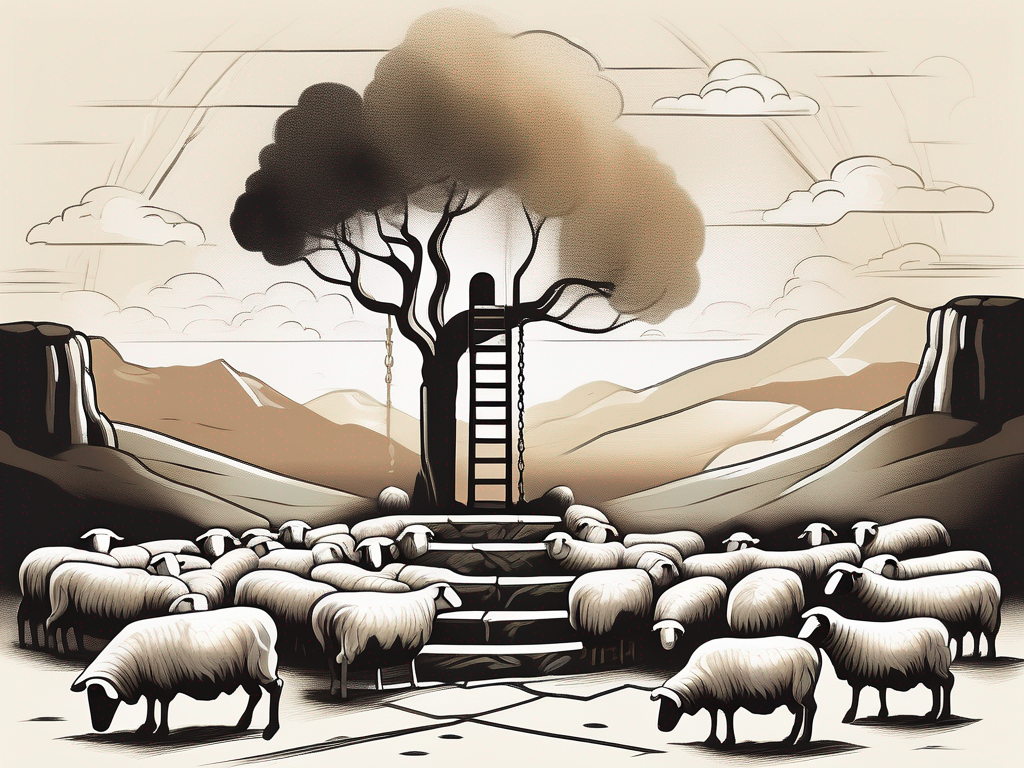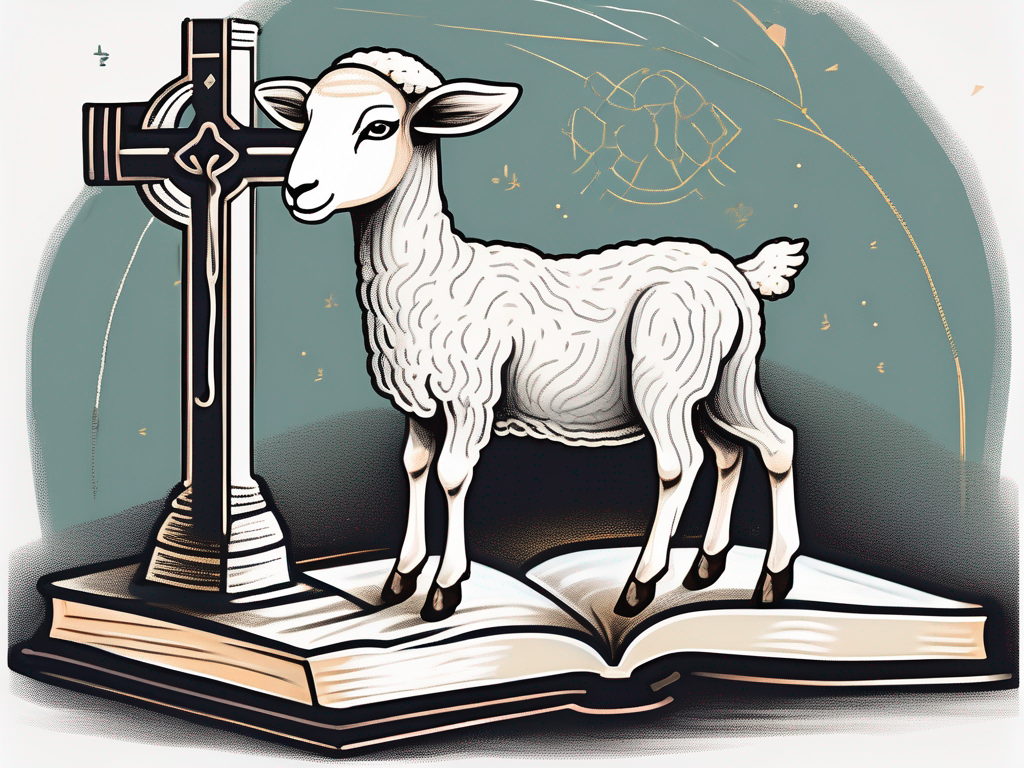In the rich tapestry of Jewish history, the figure of Reuben holds a significant place. Let’s dive into the story of Reuben, exploring his birth, his role within the family of Jacob, and his actions and their consequences. We will also delve into the tribe of Reuben, its historical significance, and the symbolism associated with Reuben in Judaism. Finally, we will discuss Reuben’s lasting legacy in modern Judaism, examining his influence today and his role in Jewish rituals and celebrations.
Understanding the Role of Reuben in Jewish History
Reuben’s story begins with his birth and early life. As the eldest son of Jacob and Leah, his position within the family hierarchy was significant. Reuben’s birth brought hope and excitement, as he was seen as the one destined to carry on his father’s legacy.
Reuben’s Birth and Early Life
Reuben entered the world surrounded by the love and anticipation of his parents. However, as life often goes, things didn’t quite turn out as expected. Reuben’s path was filled with both triumphs and trials that shaped his character and influenced his role in Jewish history.
From a young age, Reuben displayed a strong sense of responsibility and leadership. He took it upon himself to care for his younger siblings, ensuring their well-being and acting as a guiding figure in their lives. This early display of maturity and compassion set the stage for Reuben’s future role within the family and the Jewish community.
As Reuben grew older, he faced numerous challenges that tested his character. One such challenge was the incident with Bilhah, his father’s concubine. In a moment of weakness, Reuben committed a grave mistake that would have lasting consequences. This event served as a turning point in Reuben’s life, forcing him to confront his actions and seek redemption.
Despite his mistake, Reuben’s role within the family of Jacob remained significant. His position as the firstborn meant that he held a certain level of authority and responsibility. Reuben was expected to set an example for his younger siblings, guiding them in their journey and ensuring the unity of the family unit.
Reuben’s Role in the Family of Jacob
Within the intricate dynamics of the family of Jacob, Reuben played a vital role. As the firstborn, he held a position of prominence and responsibility. Reuben was expected to set an example for his younger siblings and contribute to the well-being of the family unit.
Reuben’s role extended beyond his immediate family. He became a pillar of support and guidance for the entire Jewish community. People looked up to him for his wisdom and strength, seeking his counsel in times of need. Reuben’s leadership qualities and his commitment to his faith made him a respected figure among his peers.
Throughout his life, Reuben faced numerous challenges and obstacles. However, he never wavered in his dedication to his family and his people. He took it upon himself to protect and provide for those under his care, ensuring their safety and well-being.
Reuben’s story is a testament to the complexities of human nature and the power of redemption. Despite his mistakes, he was able to learn from them and grow into a better person. His role in Jewish history serves as a reminder that even in the face of adversity, one can find strength and purpose.
Reuben in the Torah
Reuben’s significance extends beyond his role within the family. In the Torah, his actions and their consequences highlight the complexities of human nature and the impact one’s choices can have on the course of history.
Reuben, the firstborn son of Jacob and Leah, played a pivotal role in the biblical narrative. As the eldest, he held a position of authority and responsibility within the family. However, his story is not without its flaws and missteps.
In a moment of weakness and impulsiveness, Reuben committed a grave error that reverberated throughout generations. When his father Jacob was away, Reuben had an affair with Bilhah, his father’s concubine. This act of betrayal not only violated the sanctity of his father’s marriage but also disrupted the delicate balance within the family.
Reuben’s actions had severe consequences. When Jacob learned of his son’s transgression, he cursed Reuben, stripping him of his birthright as the firstborn. This curse would shape the destiny of Reuben’s descendants, as they would not receive the same privileges and blessings as the other tribes of Israel.
However, as we shall see, there is also redemption and growth in Reuben’s journey. Despite his mistakes, Reuben’s story is one of redemption.
Reuben’s Redemption
After the incident with Bilhah, Reuben underwent a transformation. He learned from his past and chose a path of righteousness and humility. In the book of Genesis, when faced with the opportunity to save his brother Joseph from being killed by his other brothers, Reuben intervened. He suggested that they throw Joseph into a pit instead, with the intention of rescuing him later. Although his plan was ultimately foiled, Reuben’s actions demonstrated remorse and a desire to make amends.
Reuben’s redemption extended beyond his immediate family. In the book of Numbers, when the tribes of Israel were preparing to enter the Promised Land, Reuben and his descendants were given a significant role. They were assigned to camp on the eastern side of the Tabernacle, alongside the tribes of Gad and half of the tribe of Manasseh. This placement signified their importance and highlighted the potential for growth and change.
Reuben’s Legacy
Reuben’s influence left a lasting impact on his descendants and the future of Israel. Despite not receiving the birthright, the tribe of Reuben played a crucial role in the history of the Israelites. They were known for their bravery and military prowess, as evidenced by their participation in battles and conquests.
Furthermore, Reuben’s descendants continued to exhibit qualities of leadership and influence. In the book of Judges, Jephthah, a judge of Israel, was from the tribe of Reuben. His leadership and victory over the Ammonites demonstrated the enduring legacy of Reuben’s lineage.
In conclusion, Reuben’s story in the Torah is a tale of redemption and growth. Despite his initial mistakes, he learned from his past and chose a path of righteousness. His influence on his descendants and the future of Israel cannot be understated. Reuben’s journey serves as a reminder that even in the face of grave errors, there is always the potential for redemption and a chance to leave a lasting positive impact.
The Tribe of Reuben
Beyond Reuben as an individual, the tribe bearing his name also played a significant role in Israel’s history and the development of the Promised Land.
The tribe of Reuben stood alongside their fellow Israelites during times of both struggle and triumph. Their contributions to the nation shaped the narrative of Israel’s journey and their place within it.
One notable event in which the tribe of Reuben played a crucial role was during the conquest of Canaan. As the Israelites faced formidable enemies and encountered various challenges, the tribe of Reuben demonstrated their bravery and unwavering commitment to their people. They fought alongside the other tribes, displaying their loyalty and dedication to the cause.
Furthermore, the tribe of Reuben made significant contributions to the religious and spiritual life of Israel. They actively participated in the worship of Yahweh and adhered to the laws and commandments given by Moses. Their commitment to their faith served as an inspiration to the other tribes, fostering a sense of unity and devotion among the Israelites.
The Tribe’s Role in Israel’s History
The tribe of Reuben not only played a vital role in the conquest of Canaan but also in the establishment of Israel as a nation. They were instrumental in the formation of the twelve tribes, each with their unique heritage and responsibilities.
Moreover, the tribe of Reuben contributed to the governance and leadership of Israel. They produced influential leaders who guided the nation through various challenges and crises. These leaders, known for their wisdom and strategic thinking, helped shape the destiny of Israel and ensured its survival in a hostile environment.
Additionally, the tribe of Reuben played a significant role in the preservation and transmission of Israel’s cultural heritage. They were custodians of ancient traditions, passing down stories, rituals, and customs from one generation to another. Their commitment to preserving their heritage strengthened the identity of the Israelites and reinforced their sense of belonging.
The Tribe’s Territory and Influence
The tribe of Reuben was allocated a specific territory in the Promised Land. This land provided them with a platform to exercise influence and make a lasting impact on the socio-political landscape of Israel.
Reuben’s territory, situated on the eastern side of the Jordan River, was known for its fertile plains and abundant resources. This geographical advantage allowed the tribe to thrive economically, engaging in agriculture, animal husbandry, and trade. Their prosperity not only benefited the tribe of Reuben but also contributed to the overall prosperity of Israel.
Furthermore, the tribe of Reuben’s location at the border of Israel made them crucial in maintaining security and defending the nation against external threats. They served as a buffer between Israel and neighboring nations, acting as a first line of defense. Their military prowess and strategic positioning ensured the safety and well-being of the entire nation.
Moreover, the tribe of Reuben’s influence extended beyond their territorial boundaries. They actively engaged in diplomatic relations with neighboring tribes and nations, fostering alliances and trade partnerships. Their ability to navigate complex political landscapes and negotiate favorable agreements contributed to the stability and growth of Israel.
In conclusion, the tribe of Reuben played a significant role in Israel’s history and the development of the Promised Land. Their contributions, both on the battlefield and in matters of governance and culture, shaped the destiny of the Israelites. The tribe of Reuben serves as a testament to the power of unity, faith, and perseverance in the face of adversity.
Reuben’s Symbolism in Judaism
Symbolism holds a special place in Jewish thought and tradition. Reuben, with his distinct characteristics and actions, carries a symbolic weight that resonates within the Jewish community.
Reuben’s Characteristics and Their Symbolic Meanings
Reuben’s character traits are emblematic of various aspects cherished in Judaism. His qualities of leadership, loyalty, and growth serve as a source of inspiration for individuals seeking to embrace these attributes.
Reuben’s Impact on Jewish Thought and Tradition
Reuben’s story permeates Jewish thought and tradition. His experiences and choices serve as a reminder of the consequences of one’s actions and the potential for growth and redemption.
Reuben’s Legacy in Modern Judaism
Reuben’s story continues to resonate with the Jewish community in modern times. His influence can be felt in various aspects of Judaism, including rituals and celebrations.
The Influence of Reuben’s Story Today
Reuben’s story remains relevant, serving as a cautionary tale and a testament to the power of repentance and transformation. His journey serves as a reminder to embrace both triumphs and trials as opportunities for growth.
Reuben’s Role in Jewish Rituals and Celebrations
Reuben’s legacy extends to Jewish rituals and celebrations. His story is woven into the fabric of Jewish tradition, and his presence is felt during significant moments of communal worship and joyous festivities.
In conclusion, understanding who Reuben was in Judaism goes beyond mere historical facts. His story serves as a reminder of the complexities of human nature, the power of choice, and the potential for growth and redemption. Through his journey, we find inspiration, lessons, and an enduring legacy that continues to shape the Jewish community today.












